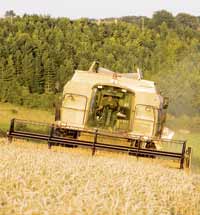Project aims to increase market for organic breadmaking wheat

Given the challenge of producing organic wheat to breadmaking specifications, it’s not surprising that a high proportion of organic bread wheat is imported.
A report out later this year will hopefully boost industry confidence in the suitability of UK-grown organic spring wheat for breadmaking, suggests Campden BRI’s Richard Stanley. He co-ordinates a LINK project that promises to increase market size in this sector.
“At last we’ve addressed the question of which variety, and clarified the most cost-effective fertiliser programmes to offer growers the best chance of achieving the specifications. Not only that, but we have firmed up on the processing methods for optimum loaf quality.”
Breadmakers, particularly in the organic sector, have always blended high protein imports with lower protein domestic wheats to produce a satisfactory loaf. Many would rather buy locally, so the idea is to produce more organic grain here with a protein content in excess of 13%.
Variety trials on organic farms with reasonable levels of fertility have confirmed there’s no need to change existing habits, though one or two agronomic techniques not commonly used could prove beneficial, he suggests.
“We know UK growers are using the best varieties they can in Paragon, Tybalt and Granary because we have compared them with high protein European and Canadian varieties grown on three sites across England. Susceptibility to disease in the latter types makes them less suitable for organic systems.”
Paragon is the only Recommended List group 1 spring wheat and a popular choice with millers. Tybalt and Granary are nabim group 2s. All three have been agronomically consistent across four different seasons, averaging 3.2t/ha last year.
As with conventional wheat, the challenge remains to achieve a specific weight of 76kg/hl and a Hagberg of 250 seconds, he adds. Weed competition threatens yield and quality, but mechanical weeders remain the only real option.
Turning to crop nutrition, Dr Stanley hopes to confirm soon whether or not it is cost-effective to use certain approved fertilisers. There was a significant advantage in grain protein and loaf volume in trials using chicken manure pellets, typically for high value crops.
“We measured a 1% increase in protein when using 170kg/ha N in the form of chicken manure pellets as a top dressing rather than ploughing in composted farmyard manure before drilling. Newcastle University will soon report back to us on the economics of investing in pellets.”
The return may be as uncertain as that from using rhizobial inoculants in previous clover cover crops. In 2006 trials, a seed treatment to stimulate nodulation of the clover paid off, while in 2008 and 2009 it was inconclusive. Perhaps on a low fertility site this method of getting more nitrogen into the system could be valuable, he believes.
HGCA believes the project could realise extra revenue of about £1.9m a year by allowing the level of incorporation in bread to rise to 50%. The HGCA contributed just £25,000 in cash and £7800 in kind of the total £1.75m.
While using high grain protein raw material is the starting point, improvements in processing such as reducing white flour extraction rates and optimising work input during mixing, can also help to produce better organic bread. Adding gluten to the flour and using a dough conditioner following organic protocols, results in a quality loaf, concludes Dr Stanley.
SUMMARY
Project 3022: Better organic bread integrating raw material and process requirements; Campden BRI, University of Newcastle upon Tyne, ADM Milling, Alara Wholefoods, Breadmatters, Courtyard Farm, Field Science, Gilchesters Organic, Maple Leaf Bakery, W&H Marriage and Sons, FWP Matthews, Norton Organic Grain, Premier Foods, Sheepdrove Organic Farm, Warburtons and DEFRA under a Sustainable Arable LINK programme; from October 2005 to July 2010.
HGCA PERSPECTIVE
Understand how to optimise organic spring wheat for breadmaking
Clarify varietal differences when grown organically
Quantify approved organic fertiliser requirements
Define the processes aiding the production of consistently high quality UK organic bread
Interim report available on HGCA website www.hgca.com/research
CROPS PERSPECTIVE
By firming up on both production and processing requirements, this project should help organic growers and millers supply a product that can compete with high protein wheat imports. Opening up markets for UK spring wheat will benefit the whole industry.

